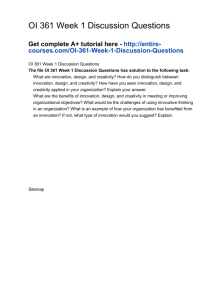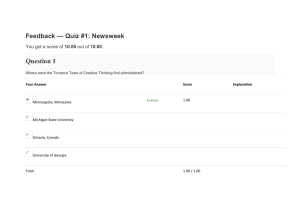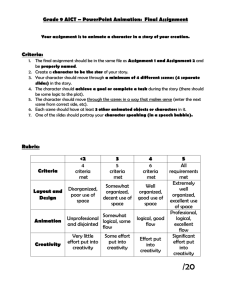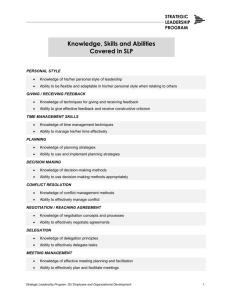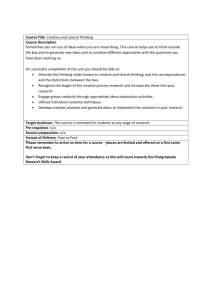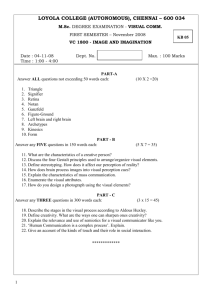Assessment Component
advertisement
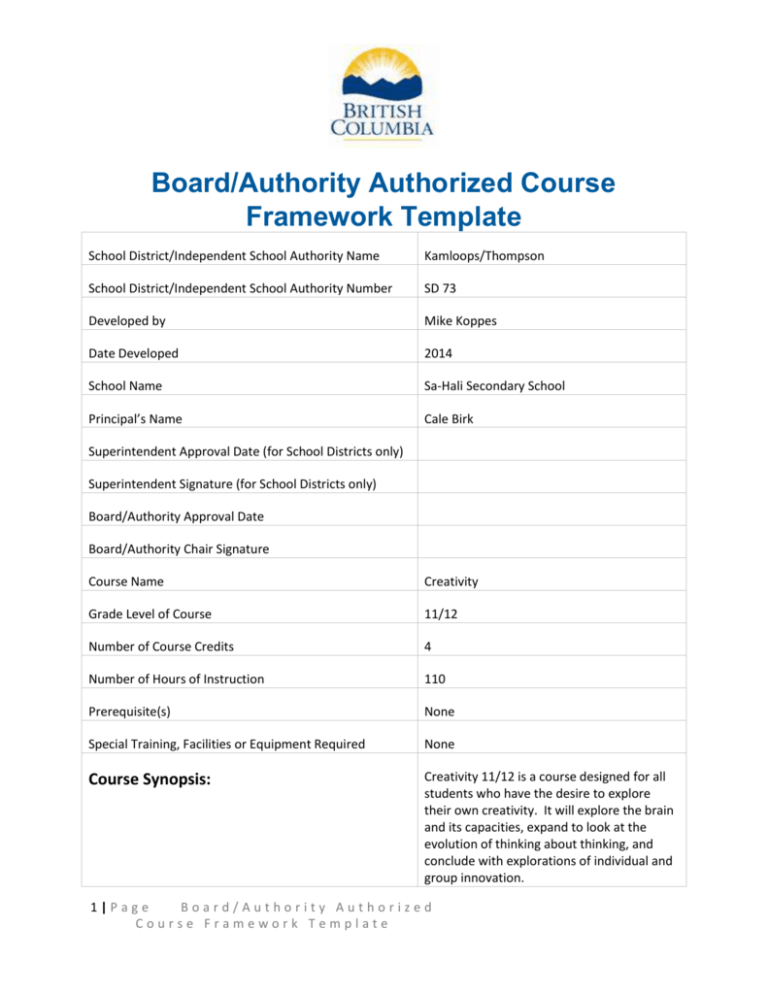
Board/Authority Authorized Course Framework Template School District/Independent School Authority Name Kamloops/Thompson School District/Independent School Authority Number SD 73 Developed by Mike Koppes Date Developed 2014 School Name Sa-Hali Secondary School Principal’s Name Cale Birk Superintendent Approval Date (for School Districts only) Superintendent Signature (for School Districts only) Board/Authority Approval Date Board/Authority Chair Signature Course Name Creativity Grade Level of Course 11/12 Number of Course Credits 4 Number of Hours of Instruction 110 Prerequisite(s) None Special Training, Facilities or Equipment Required None Course Synopsis: Creativity 11/12 is a course designed for all students who have the desire to explore their own creativity. It will explore the brain and its capacities, expand to look at the evolution of thinking about thinking, and conclude with explorations of individual and group innovation. 1|Page Board/Authority Authorized Course Framework Template Rationale: Students today are faced with a large gap between standard practices in education and the constantly evolving job market. While content-driven tasks are effective in many regards, students often do not have the opportunity to evolve and explore their own creative minds. Creativity 11/12 is designed to have individuals and groups share ideas and evolve solutions in a think-tank format. If we want students to explore their capacities as individuals and in groups, we need to provide them with opportunities to think divergently. Creativity 11/12 aims to have students apply their learning to hypothetical and realworld scenarios and to provide opportunities for them to find answers to questions of importance to them. Organizational Structure: Unit Title Time Assessment Value Unit 1 Group Dynamics and Collaboration 10 hours 10% Unit 2 The Creative Mind 15 hours 15% Unit 3 Models of Thought 30 hours 20% Unit 4 Divergent Thinking 30 hours 20% Unit 5 Global Creative Solutions 15 hours 10% Unit 6 Presentation of Learning 10 hours 25% 110 100% Total Hours Units 1, 2, 3, and 4 function as individual components of Creativity 11/12. Units 5 and 6 are related to one another and as such the time allotted and assessment values for these two units are interconnected. 2|Page Board/Authority Authorized Course Framework Template Course Overview: Unit 1 – Group Dynamics and Collaboration Objectives: Students will explore the human experience as it relates to groups, groupings, and effective group processes. Students will learn about and practice group work, roles within groups, and leadership. Students will develop a common language concerning group activities. Students will learn to give and receive constructive feedback. Students will consider the link between empathy and productivity in group processes. Students will examine their own personalities and how differences in individuals can complement or compromise a group process. Unit 2 - The Creative Mind Objectives: Students will explore current research on neuroscience and the creative mind. Students will explore individual capacities for creativity and research factors that affect creative potential. Students will explore historical ideas on thinking and those individuals and groups who have historically evolved our thinking about thinking. Unit 3 – Models of Thought (Sociology, Psychology, Philosophy, Anthropology) Objectives: Students will explore thinking from interpersonal, cultural, and cognitive perspectives. Students will explore the notion of “common sense” across cultures and throughout history. 3|Page Board/Authority Authorized Course Framework Template Students will experience a survey of sociology, psychology, philosophy, and anthropology as they pertain to creativity and the human creative process. Unit 4 - Divergent Thinking Objectives: Students will explore and practice brainstorming and thought-mapping. Students will exercise their creativity and practice creative problem-solving in facing divergent thinking challenges. Students will employ learned group skills and common language to support, with empathy, a thorough brainstorming process. Students will share and present their divergent thinking explorations in variety of formats. Unit 5 - Global Creative Solutions Objectives: Students, in groups, will evolve and then propose a creative resolution to a real-world problem. Students will take on specific roles in the group to support the team solutions. Students will track and journal their resolution's evolution. Unit 6 – Presentation of Learning Objectives: Students will employ their learned group work systems to evolve a formal presentation of their Global Creative Solution. Students will present their ideas to a school - and community-based audience in a professional manner. Students will expand and defend their ideas and Global Creative Solution before a panel of school and community 'judges'. (A school judge might be a board member, a trustee, business teacher, or administrator. A community judge would ideally be an innovator in their area. In Kamloops, the Kamloops Innovation Council would provide many possible 'judges'.) 4|Page Board/Authority Authorized Course Framework Template Instructional Strategies Creativity 11/12 will require diverse and varied teaching methods including, but not limited to, the following: direct instruction indirect instruction discovery and sharing print, non-print, and oral presentations modelling brainstorming/spooling group work on-line collaborations evaluation and analysis of print and non-print media self and group evaluation guest speakers The teacher will act as lecturer, facilitator, mentor, and collaborator. In order for the students to evolve and explore their own creativity – and apply it to all aspects of the course – the teacher's methodology must be flexible and adaptable. Students will learn core concepts and content through direct instruction, but learning will also be experiential and collaborative in nature. Assessment Component The course will be assessed through journaling, activities, presentations, and conferencing. There will be no standardized assessments or traditional tests in this course. Unit 1 – value 10%. The core assessment of Unit 1 will be around student experience and reflection on group processes. A common failing of group tasks is that groups do not evolve resiliency as they are typically one-time undertakings. Students will be asked to experience and reflect on the evolution of their group experiences via conference and a reflective essay. Unit 2 – value 15%. Assessment of Unit 2 will focus on two main areas. First, the students will explore and work with scientific and historical thinking about thinking, and present their findings. Second, the 5|Page Board/Authority Authorized Course Framework Template students will conduct a variety of individual surveys and make a presentation to the class which utilizes their own creative process. Unit 3 – value 20%. Largely consisting of direct instruction, Unit 3 and the academic survey of sociology, psychology, philosophy, and anthropology, will be assessed through research-based written activities and a 'creative expose' on the discipline of their choice. Unit 4 – value 20%. The most dynamic portion of the course, student assessment will be ongoing and reflective. Measuring creative output, creative resiliency, brainstorming, mind-mapping, and presentation skills, Unit 4 will evolve with the class. Unit 5 – value 10%. Students will research and evaluate several possible real-world problems they would like to solve. Students will provide their rationale and a formal written proposal for their choice of a Presentation of Learning topic (see below). Unit 6 – value 25%. Presentation of Learning. Unit 6 contains the largest single assessment in the course. 5% of the unit mark will be derived from each student's self-evaluation and analysis of the presentation of learning, while a full 20% of the course mark will come from the Presentation of Learning. While the Presentation of Learning will be subject to a panel of school and community judges, students will not be evaluated directly from their findings. The judges will conference and help to inform the classroom teacher who will conduct the evaluation of the Presentation of Learning. Learning Resources The Internet – scholarly articles, visuals, activities Thompson Nicola Library System Henry Grube Educational Centre Community members and professionals, both local and outside of our community: Kamloops Innovation Council members Industry professionals via Skype, Hangouts, and other communication media applications Video conferencing with innovators, inventors, and entrepreneurs 6|Page Board/Authority Authorized Course Framework Template

